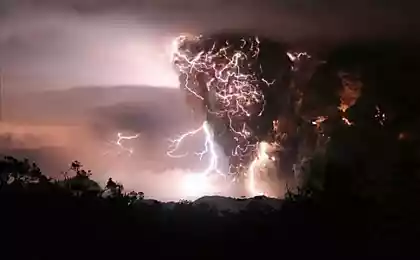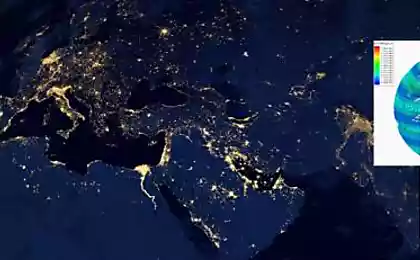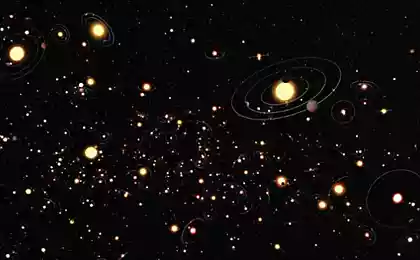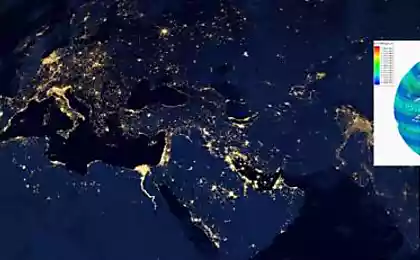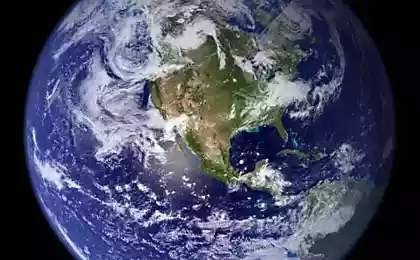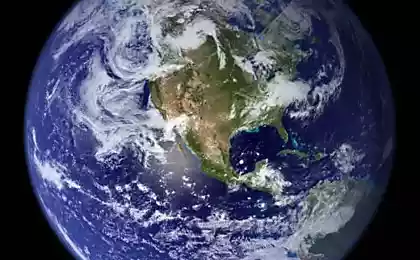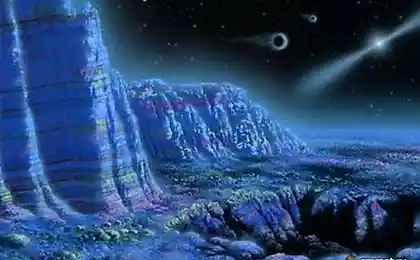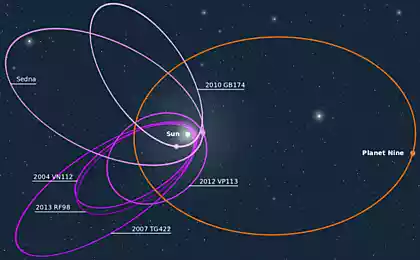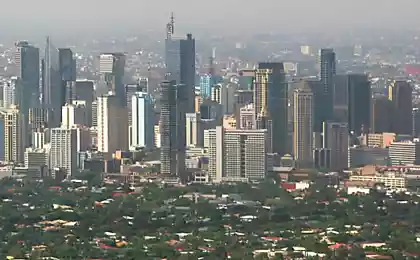2174
Earth - a beautiful and terrible
Earth is beautiful and terrible for its natural and man-made objects. They fascinate and frighten at the same time. One of such objects are holes in the ground, some human and other natural origin. All of them have one thing in common - they are almost perfectly round and so beautiful, but when you reflect on the forces, and wounded planet, is not alone.
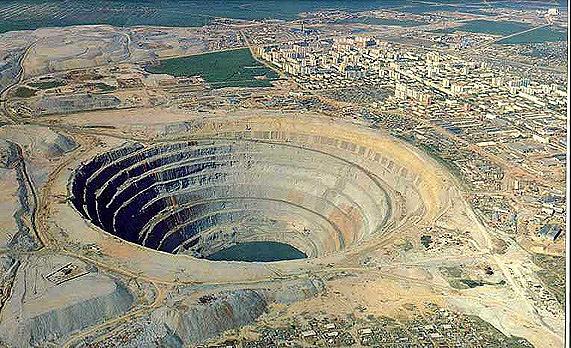
1.Almazny careers in Mirny in Yakutia. It is called a man-made monster, located right in the city, unpretentious - World. The depth of the hole reaches 525 meters, and the diameter - 1200 meters. Some call mine "navel of the earth," and there is a rumor that of a giant funnel banned helicopter flights, as they with great force sucked inside. Forty-five years of mine regularly supplies the market with diamonds, recognized standard of quality and beauty. Architectural bureau "AB Alice" draft "eco-city" to be built in the crater. Eco-city in 2020 provides for the construction of a giant city, which can accommodate more than 100 thousand people. The construction will be divided into three main levels with residential areas and recreational and entertainment. One of the features of the project - to protect the city glass roof covered with solar cells.
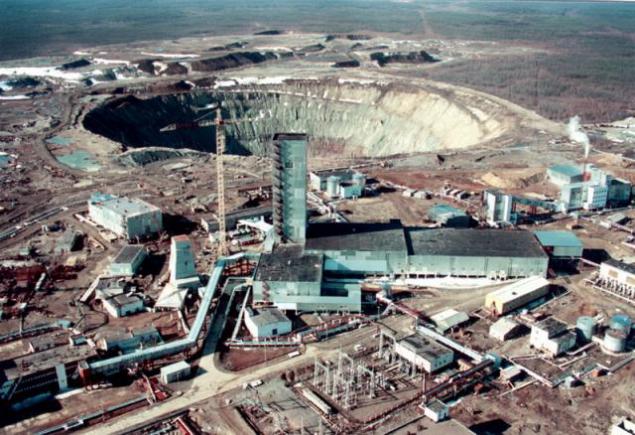
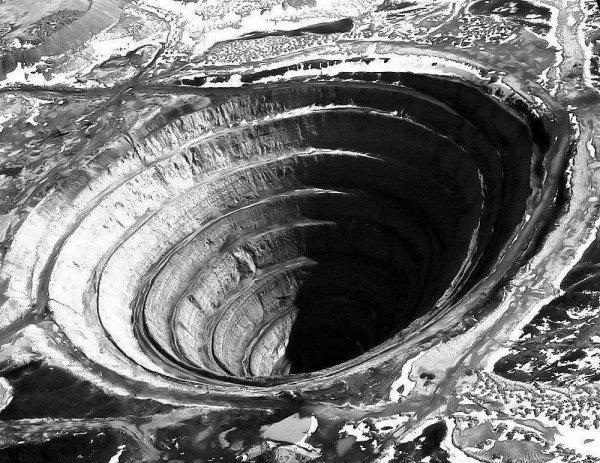
2. "Big Hole" Kimberley in South Africa. BIG has made famous Hole is also a diamond mine, and developed manually. People seized about 22 million tons of rock to produce only three tons of the precious stone. The quarry closed in 1914, and today its morphology resembles a volcanic crater. Size of the circle is about 1, 8 kilometers, and steep walls fall to a depth of 1,200 meters. Underground water filled crater half, but that does not stop tourists to admire its grandeur.
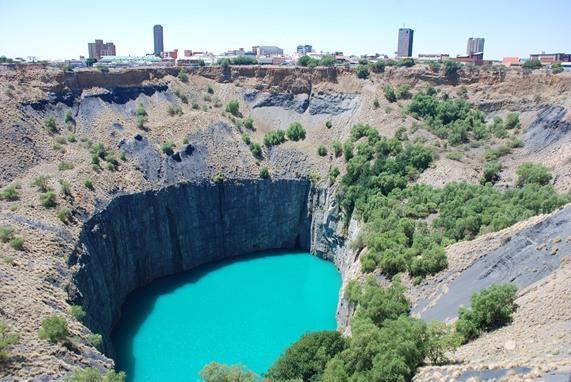
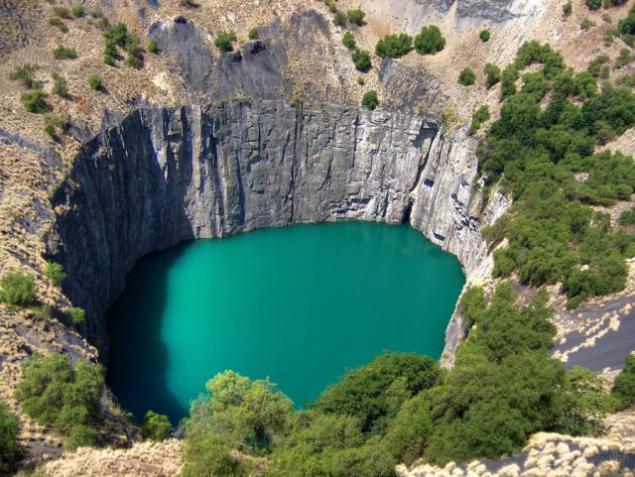
3. Funnel Monticello Dam, Napa, California, USA. Queen of all man-made craters, the embodiment of cosmic black hole. We are talking about a huge round-shaped spillway water, which is called "black hole", that way it is seen by pilots from the air. In fact, it's just a giant pipe with a diameter of 22 meters to control the water level near the dam. Damper open in the rainy season to lose the excess volume of water and to avoid damage to the body of the dam. The speed of the water in the crater - about 1,370 cubic meters per second. Construction of the dam was completed in 1957. This arched structure with a height of 93 meters and a length of 312 meters. And, as you might guess, swim in the reservoir when the funnel is open, smoking - suck.
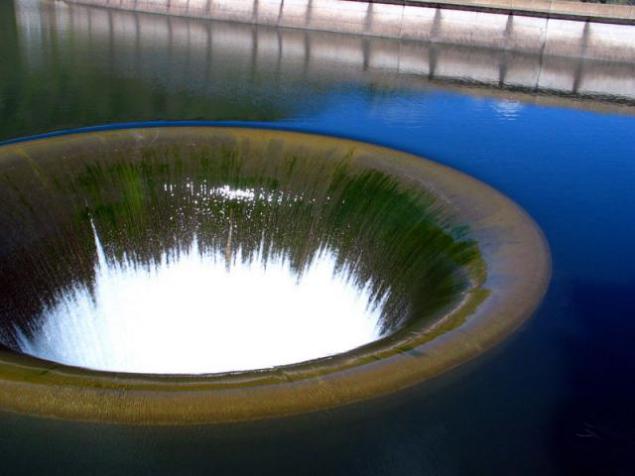
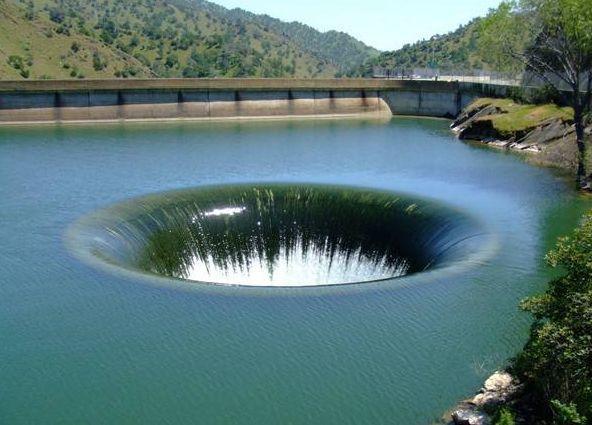
4.Bingeym Canyon in Utah, USA. The largest active mining open pit type mining copper, molybdenum, gold and silver. Located near the city of Salt Lake City. Has the honorary title of the largest man-made excavation. Profile Development began in 1863 and continues to this day because of the high performance. Produced more than 17 million tons of copper, 652 tons of gold and 5,386 tons of silver. This quarry depth of 1,200 meters and a width of 4,000 meters, in 1966 was declared a national historical heritage and the United States became a place of tourist
pilgrimage. Here undeveloped viewing platform from which you can watch below boiling operation.
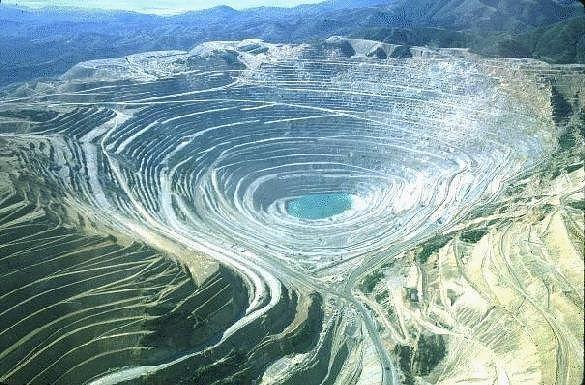
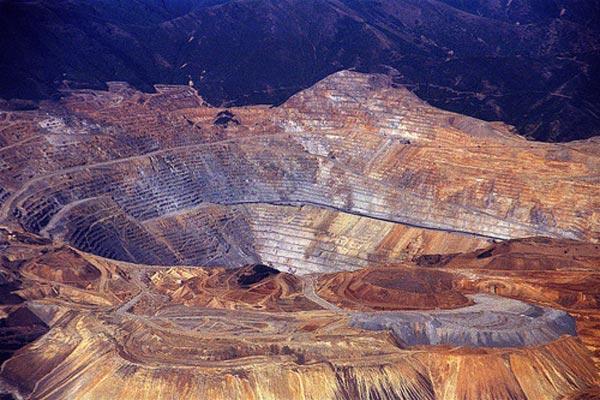
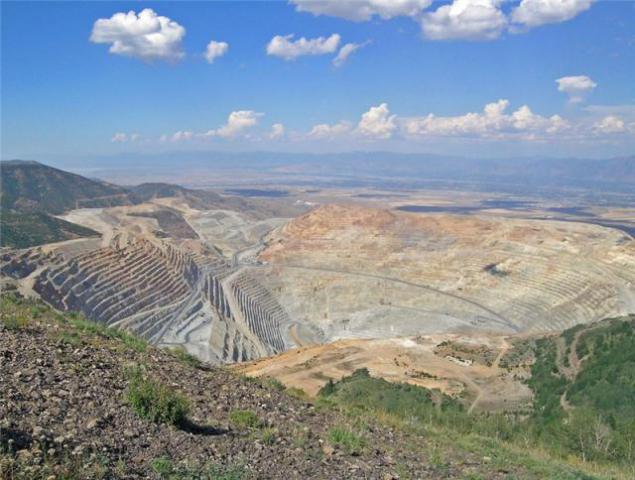
5.The Great Blue Hole - literally, "Great Blue Hole" a place that has become a cult classic thanks to the famous Jacques Yves Cousteau who included it in the top ten best places for diving. This amazing circular shape coral cave has more than 300 meters wide and 145 meters deep, its dimensions suggest it the largest known cave on earth. It is located in the Caribbean Sea 100 miles from Belize City. The richness of the underwater world of coral reefs and stunning clarity of the water along with the unusual shape made The Great Blue Hole diving mecca.
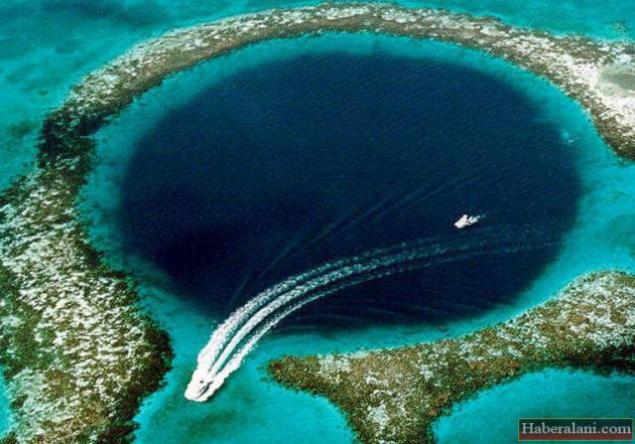
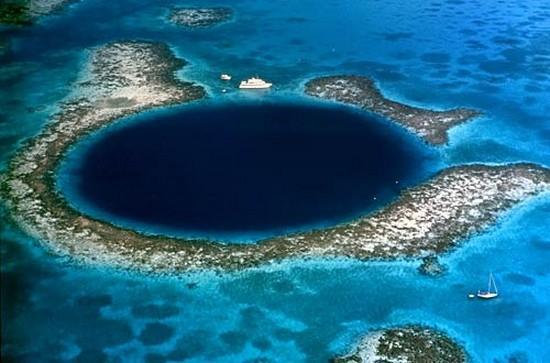
6.Propasti Sarisarinyama, Venezuela. These strange round holes are located on a plateau at an altitude of 2300 meters above sea level in the southern part of Venezuela (Bolivar state) and are known as mysterious failures Sarisarinyama. Have a diameter of about 350 meters and strange origin. Some of the holes not only have perfectly correct form, but their depth strangely coincides with the diameter. One of the theories of the formation of these failures indicates erosion of underground rivers, in certain places blur sandstone. This region is known for some of Venezuela's endemic plants and animals, indicating that its long isolation. "The Lost World" today is not available to ordinary tourists.
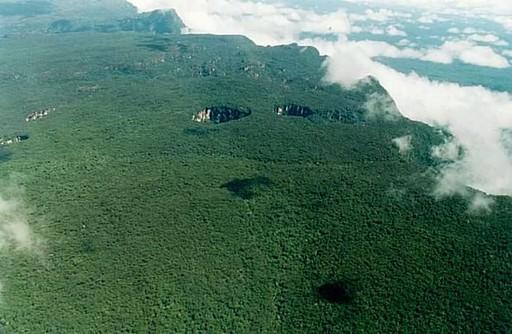
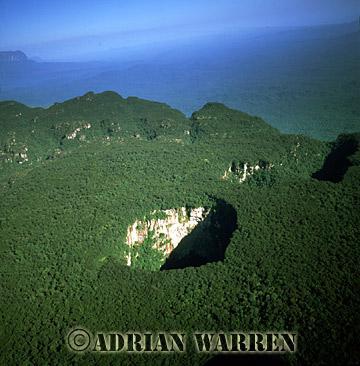
7. Meteor Crater Berringer, Arizona, USA. Some meteorites fallen to the ground, like the Tunguska not left a crater. But here's Crater Berringer perfectly preserved and has a "moon" shape. He is a huge basin of 1,200 meters wide and 200 meters deep. The meteorite was a width of about 30 meters and a weight of about 100 thousand tons and hit the Earth's surface about 50 thousand years ago. He was big enough to form a clearly defined impressive crater, and is small enough to wipe out the region.
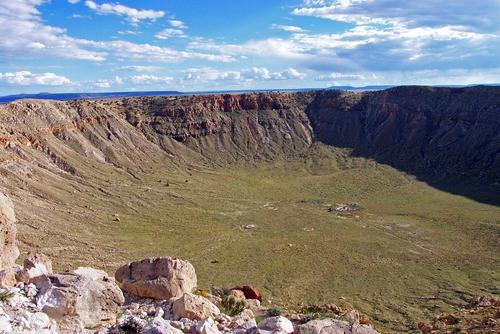
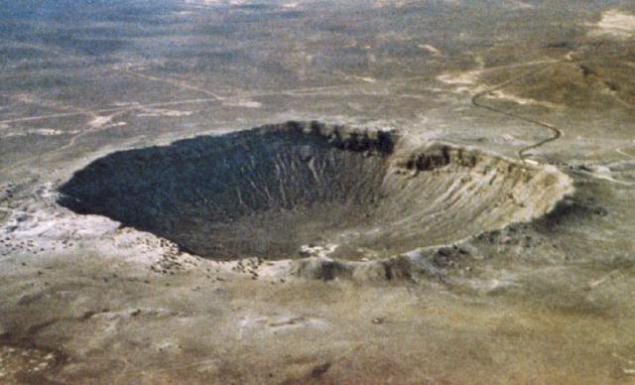
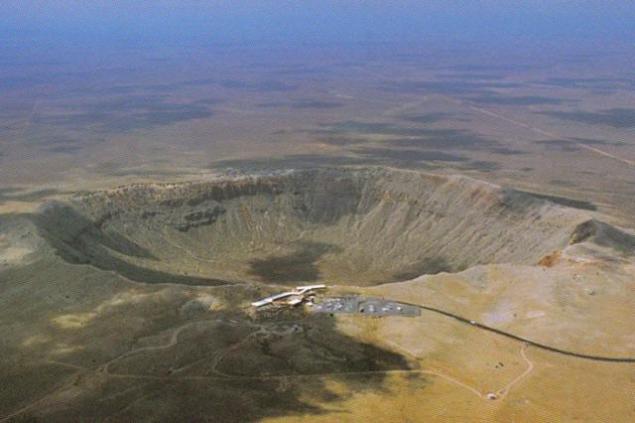
10. Karst failure in Guatemala. The failure of the soil with a diameter of 30 meters and a depth of about 60 meters swallowed a dozen buildings in Guatemala City in the homonymous country. The tragedy occurred in July 2010 after the passage of a tropical cyclone Agatha. In the "jaws of the devil", killing two people. Geologists explain the unusual circular shape of the failure of karst underground caves. The soil in this place is rich in limestone, salts that dissolve easily in water. Such failures are characteristic of the southern states of the US and Central America, but the size and perfectly round shape overshadowed the rest.
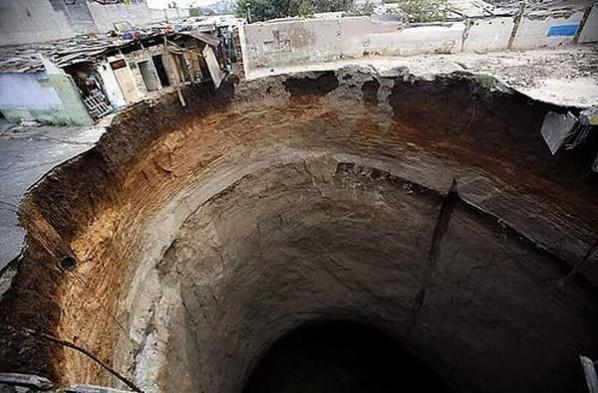
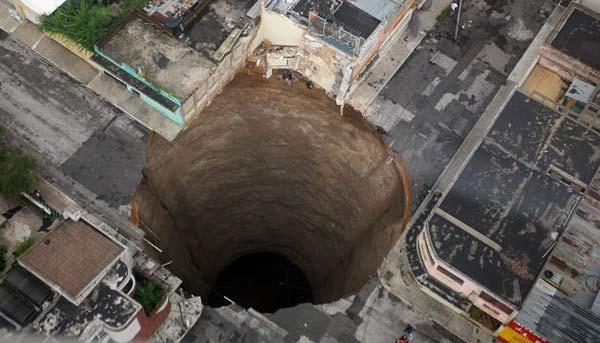
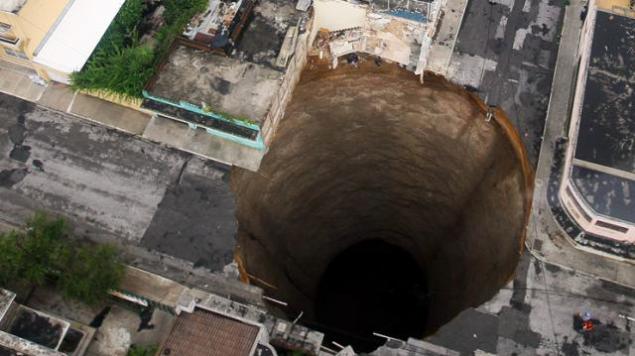

1.Almazny careers in Mirny in Yakutia. It is called a man-made monster, located right in the city, unpretentious - World. The depth of the hole reaches 525 meters, and the diameter - 1200 meters. Some call mine "navel of the earth," and there is a rumor that of a giant funnel banned helicopter flights, as they with great force sucked inside. Forty-five years of mine regularly supplies the market with diamonds, recognized standard of quality and beauty. Architectural bureau "AB Alice" draft "eco-city" to be built in the crater. Eco-city in 2020 provides for the construction of a giant city, which can accommodate more than 100 thousand people. The construction will be divided into three main levels with residential areas and recreational and entertainment. One of the features of the project - to protect the city glass roof covered with solar cells.


2. "Big Hole" Kimberley in South Africa. BIG has made famous Hole is also a diamond mine, and developed manually. People seized about 22 million tons of rock to produce only three tons of the precious stone. The quarry closed in 1914, and today its morphology resembles a volcanic crater. Size of the circle is about 1, 8 kilometers, and steep walls fall to a depth of 1,200 meters. Underground water filled crater half, but that does not stop tourists to admire its grandeur.


3. Funnel Monticello Dam, Napa, California, USA. Queen of all man-made craters, the embodiment of cosmic black hole. We are talking about a huge round-shaped spillway water, which is called "black hole", that way it is seen by pilots from the air. In fact, it's just a giant pipe with a diameter of 22 meters to control the water level near the dam. Damper open in the rainy season to lose the excess volume of water and to avoid damage to the body of the dam. The speed of the water in the crater - about 1,370 cubic meters per second. Construction of the dam was completed in 1957. This arched structure with a height of 93 meters and a length of 312 meters. And, as you might guess, swim in the reservoir when the funnel is open, smoking - suck.


4.Bingeym Canyon in Utah, USA. The largest active mining open pit type mining copper, molybdenum, gold and silver. Located near the city of Salt Lake City. Has the honorary title of the largest man-made excavation. Profile Development began in 1863 and continues to this day because of the high performance. Produced more than 17 million tons of copper, 652 tons of gold and 5,386 tons of silver. This quarry depth of 1,200 meters and a width of 4,000 meters, in 1966 was declared a national historical heritage and the United States became a place of tourist
pilgrimage. Here undeveloped viewing platform from which you can watch below boiling operation.



5.The Great Blue Hole - literally, "Great Blue Hole" a place that has become a cult classic thanks to the famous Jacques Yves Cousteau who included it in the top ten best places for diving. This amazing circular shape coral cave has more than 300 meters wide and 145 meters deep, its dimensions suggest it the largest known cave on earth. It is located in the Caribbean Sea 100 miles from Belize City. The richness of the underwater world of coral reefs and stunning clarity of the water along with the unusual shape made The Great Blue Hole diving mecca.


6.Propasti Sarisarinyama, Venezuela. These strange round holes are located on a plateau at an altitude of 2300 meters above sea level in the southern part of Venezuela (Bolivar state) and are known as mysterious failures Sarisarinyama. Have a diameter of about 350 meters and strange origin. Some of the holes not only have perfectly correct form, but their depth strangely coincides with the diameter. One of the theories of the formation of these failures indicates erosion of underground rivers, in certain places blur sandstone. This region is known for some of Venezuela's endemic plants and animals, indicating that its long isolation. "The Lost World" today is not available to ordinary tourists.


7. Meteor Crater Berringer, Arizona, USA. Some meteorites fallen to the ground, like the Tunguska not left a crater. But here's Crater Berringer perfectly preserved and has a "moon" shape. He is a huge basin of 1,200 meters wide and 200 meters deep. The meteorite was a width of about 30 meters and a weight of about 100 thousand tons and hit the Earth's surface about 50 thousand years ago. He was big enough to form a clearly defined impressive crater, and is small enough to wipe out the region.



10. Karst failure in Guatemala. The failure of the soil with a diameter of 30 meters and a depth of about 60 meters swallowed a dozen buildings in Guatemala City in the homonymous country. The tragedy occurred in July 2010 after the passage of a tropical cyclone Agatha. In the "jaws of the devil", killing two people. Geologists explain the unusual circular shape of the failure of karst underground caves. The soil in this place is rich in limestone, salts that dissolve easily in water. Such failures are characteristic of the southern states of the US and Central America, but the size and perfectly round shape overshadowed the rest.








